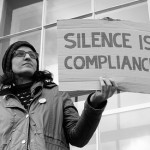If we think we can close our eyes to these things and declare ourselves blissfully colorblind while our brothers and sisters still bear the impact of a world that is in fact not colorblind, while they bear down under the weight of this oppression, and we plug our ears and cover our eyes … and if this is brought to our attention (for we are only responsible to confront the truth we are told about) and we still refuse to hear and to see, there is indeed a spiritual deadness that is infecting our hearts.
And this spiritual deadness is not limited to the Christian conservative. It is found in every white person who so convinces themselves that they are the good guys that they no longer are able to be sensitive to conviction of wrongdoing. (And certainly, deadness is common to the human condition, but here in this piece, I am specifically speaking to the sin of my fellow white countrymen. I will leave it to others to discuss the sin in other communities.)
In the film, one particularly stinging indictment of white America is found in Baldwin’s critique of Attorney General Robert F. Kennedy, that liberal icon. At one point, during the period of school desegregation, RFK was approached by author Lorraine Hansberry and asked to convince his brother, President John F. Kennedy, to walk a black child to school. Rather than respond to these request and consider that he could learn something from a leader in the blck community, RFK replied that to do so would be a “meaningless” moral gesture. Another time, RFK said, according to Baldwin, that
it was conceivable that in forty years in America, we might have a Negro President. And that sounded like a very emancipated statement, I suppose, to white people. They were not in Harlem when this statement was first heard and did not hear, and possibly will never hear the laughter and the bitterness and the scorn with which this statement was greeted. From the point of view of the man in the Harlem barbershop, Bobby Kennedy only got here yesterday. And now he’s already on his way to the presidency. We’ve been here four hundred years, and now he tells us that maybe in forty years “if you’re good, we may let you become President.”
RFK’s words smack of white supremacy, that way of life or belief that leads to behavior suggesting whites are superior to or supreme to other races.












